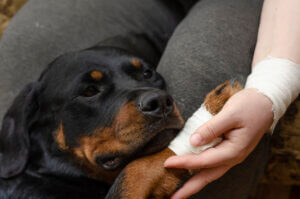What to Do When Your Pet Has an Accident

No one knows what the future holds for their pets, and knowing how to act in an emergency can save their lives. That’s why today we’ll explain what to do when your pet has an accident so that you can react intelligently to the difficult situation and look after your best friend’s health.
The world can be a very dangerous place and can take the lives of our pets in the blink of an eye. From contusions, cuts, wounds and fractures, to poisoning and domestic and traffic accidents, animals can be exposed to multiple dangers that put their well-being at risk.
5 things to do when our pet has an accident
Helping our furry friend when it suffers an accident can be a very difficult situation for many people. However, if we want to provide prompt and timely care, it’s important to remain calm in order to look after their welfare. Because, no matter how painful the scene may be, animals need our help and company to know that everything will be all right.
This is a basic guide on how to act when our pet has an accident.

1. Lay it down and give it first aid
After a strong blow or a car accident that can compromise the dog’s life, the first thing to do is to put the animal in a safe place and lay it on its right side. If it’s been knocked unconscious by the impact, you have to straighten its neck, open its mouth, and then gently stick out its tongue to allow air to enter.
This would be a good time to immediately call a mobile veterinarian to come to your home as soon as possible and provide your pet with the professional care it needs. This option is ideal in order to save time that can be vital and can even be helpful during recovery to visit your dog periodically.
2. Take its pulse rate
After checking that your dog is breathing and observing the rise and fall of its chest, you should take its pulse on the inside of its hind legs for 15 seconds and multiply it by four to calculate its heart rate. Keep in mind that the number of beats per minute varies depending on the size and breed of the dog as follows.
– Small dogs: 90-140 beats per minute
– Medium-size dogs: 70-110 beats per minute
– Large dogs: 60-90 beats per minute.
An alteration of the usual pulsations (both above or below) implies a greater risk of suffering cardiac complications, and it‘s essential to go immediately to a veterinary center in case the animal requires resuscitation.

3. Immediately stop any possible bleeding
Depending on the accident, your pet may have suffered external bleeding, and it’s essential that you stop it as soon as possible to avoid excessive bleeding. To do this, place a wet cloth compress (never cotton) over the wound and apply pressure by holding it tightly or using a bit of medical tape.
If the bleeding was caused by the bite of another animal, you should carefully cut the hair around the wound and with the help of a dermal disinfectant, clean the infected area. After this, apply an antiseptic cream and cover the area with gauze to prevent the animal from licking it. However, if the wound is very deep, you’ll need to visit a veterinarian.
4. In case of poisoning, act quickly
According to the American Society for the Prevention of Cruelty to Animals (ASPCA), some of the common symptoms of poisoning include convulsions, vomiting, disorientation, and foaming at the mouth. If you suspect that your furry friend is going through this situation, you must react quickly to avoid further complications.
So, before taking it immediately to a veterinary center, you should give it plenty of water or milk to dilute the poison a little. Also, if possible, identify the substance and take a test to bring it to the professional.
5. Go to the veterinarian as soon as possible
After applying the first aid steps described above, it’s time to pick up your pet, being careful not to cause too much pain, and take it to a veterinarian you trust so that they can evaluate its condition and alleviate its suffering.
It’s because of these emergencies that it’s always a good idea to purchase veterinary insurance for our pets to be sure that a professional will be there to help them. Also, remember that health check-ups are recommended a couple of times a year.
When your pet has an accident, it’s crucial to know how to react
The worst accidents happen when nobody expects them, and knowing how to face emergencies can save your pet’s life. So, if at some point in your life, you have to face such a difficult situation, remember to have an emergency kit on hand to provide your pet with first aid and then go to a veterinary center as soon as possible.
No one knows what the future holds for their pets, and knowing how to act in an emergency can save their lives. That’s why today we’ll explain what to do when your pet has an accident so that you can react intelligently to the difficult situation and look after your best friend’s health.
The world can be a very dangerous place and can take the lives of our pets in the blink of an eye. From contusions, cuts, wounds and fractures, to poisoning and domestic and traffic accidents, animals can be exposed to multiple dangers that put their well-being at risk.
5 things to do when our pet has an accident
Helping our furry friend when it suffers an accident can be a very difficult situation for many people. However, if we want to provide prompt and timely care, it’s important to remain calm in order to look after their welfare. Because, no matter how painful the scene may be, animals need our help and company to know that everything will be all right.
This is a basic guide on how to act when our pet has an accident.

1. Lay it down and give it first aid
After a strong blow or a car accident that can compromise the dog’s life, the first thing to do is to put the animal in a safe place and lay it on its right side. If it’s been knocked unconscious by the impact, you have to straighten its neck, open its mouth, and then gently stick out its tongue to allow air to enter.
This would be a good time to immediately call a mobile veterinarian to come to your home as soon as possible and provide your pet with the professional care it needs. This option is ideal in order to save time that can be vital and can even be helpful during recovery to visit your dog periodically.
2. Take its pulse rate
After checking that your dog is breathing and observing the rise and fall of its chest, you should take its pulse on the inside of its hind legs for 15 seconds and multiply it by four to calculate its heart rate. Keep in mind that the number of beats per minute varies depending on the size and breed of the dog as follows.
– Small dogs: 90-140 beats per minute
– Medium-size dogs: 70-110 beats per minute
– Large dogs: 60-90 beats per minute.
An alteration of the usual pulsations (both above or below) implies a greater risk of suffering cardiac complications, and it‘s essential to go immediately to a veterinary center in case the animal requires resuscitation.

3. Immediately stop any possible bleeding
Depending on the accident, your pet may have suffered external bleeding, and it’s essential that you stop it as soon as possible to avoid excessive bleeding. To do this, place a wet cloth compress (never cotton) over the wound and apply pressure by holding it tightly or using a bit of medical tape.
If the bleeding was caused by the bite of another animal, you should carefully cut the hair around the wound and with the help of a dermal disinfectant, clean the infected area. After this, apply an antiseptic cream and cover the area with gauze to prevent the animal from licking it. However, if the wound is very deep, you’ll need to visit a veterinarian.
4. In case of poisoning, act quickly
According to the American Society for the Prevention of Cruelty to Animals (ASPCA), some of the common symptoms of poisoning include convulsions, vomiting, disorientation, and foaming at the mouth. If you suspect that your furry friend is going through this situation, you must react quickly to avoid further complications.
So, before taking it immediately to a veterinary center, you should give it plenty of water or milk to dilute the poison a little. Also, if possible, identify the substance and take a test to bring it to the professional.
5. Go to the veterinarian as soon as possible
After applying the first aid steps described above, it’s time to pick up your pet, being careful not to cause too much pain, and take it to a veterinarian you trust so that they can evaluate its condition and alleviate its suffering.
It’s because of these emergencies that it’s always a good idea to purchase veterinary insurance for our pets to be sure that a professional will be there to help them. Also, remember that health check-ups are recommended a couple of times a year.
When your pet has an accident, it’s crucial to know how to react
The worst accidents happen when nobody expects them, and knowing how to face emergencies can save your pet’s life. So, if at some point in your life, you have to face such a difficult situation, remember to have an emergency kit on hand to provide your pet with first aid and then go to a veterinary center as soon as possible.
This text is provided for informational purposes only and does not replace consultation with a professional. If in doubt, consult your specialist.








